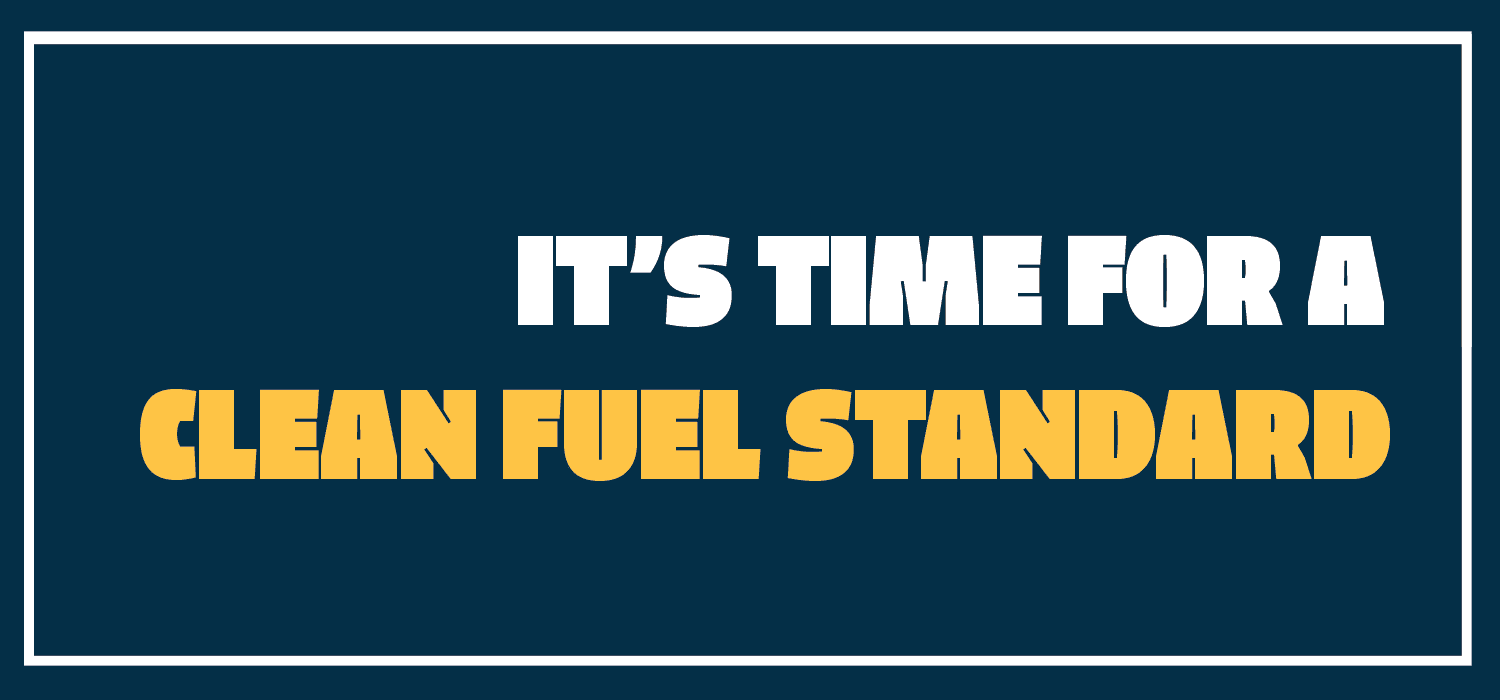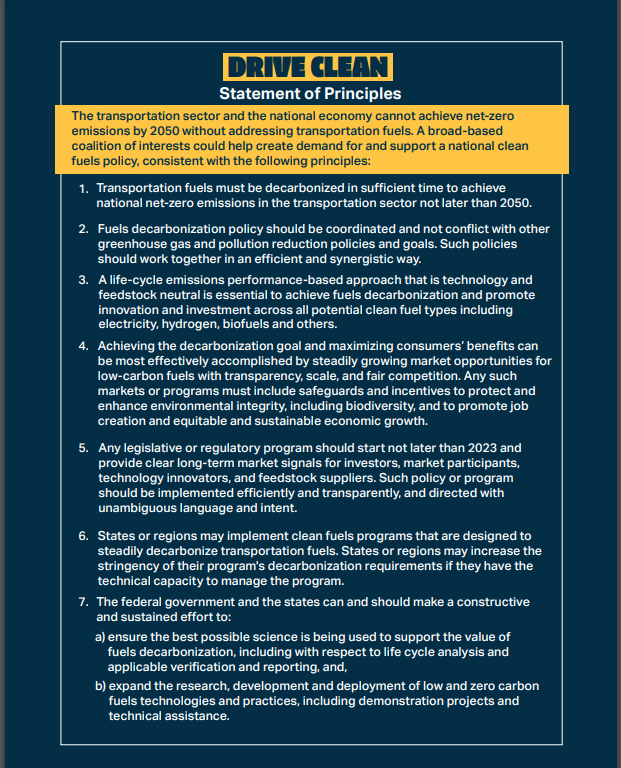
DriveClean, a broad-based, multi-sector initiative representing agriculture, utilities, renewable fuel producers, environmentalists, technology firms, EV charging companies, and truck and bus manufacturers, today issued a call for lawmakers to draft and pass bipartisan legislation creating a market-based, technology-neutral national Clean Fuel Standard (CFS) during the 118th Congress that convenes in January.
A national CFS would harness market forces to drive decarbonization of the transportation sector, which accounted for 27% of U.S. greenhouse gas emissions in 2020. DriveClean is calling on Congress to enact a technology-neutral CFS. To help guide this effort, the initiative members unveiled a website, DriveClean.us, and principles for lawmakers.
“When you see support for a CFS coming from diverse players like environmental groups, electric vehicle supply chain companies and renewable fuel advocates, it’s notable,” said Chris Miller, a former senior policy adviser in the Senate on energy and environmental matters who is now providing strategic counsel to the group.
A federal CFS would decarbonize the transportation sector by setting a schedule for gradually reducing the carbon intensity of fuel sources used to transport people and goods. Fuels would compete on the basis of an annual average carbon score assigned to all fuel sources; the lower the carbon score, the more valuable a gallon (or gallon equivalent) of a fuel source becomes. Fuel sources with a carbon score lower than the baseline generate credits. Fuel providers can obtain credits by blending in renewable fuels; purchasing credits from other sources; and enhancing their efficiency using renewable energy.
DriveClean is publicly releasing its principles – which were the result of an inclusive stakeholder process – to put a CFS on the agenda for the next Congress. While transportation-related provisions included in the Inflation Reduction Act (IRA) will encourage investments in new fuels, clean vehicles and infrastructure, recent modeling* shows the law will have little impact in meeting the near-term emissions reductions goal of 50-52% by 2030.
“Congress must take additional steps to reduce emissions in the transportation sector by 2030 if we have any chance at all of transitioning to a net-zero economy by 2050,” said Miller. “A technology-neutral CFS would accelerate the transition to a cleaner transportation sector by sending a strong signal to markets and providing the certainty investors need for long-term planning.”
In addition to cleaning up air pollution spread by fossil-fueled powered vehicles, a CFS will boost domestic manufacturing across multiple sectors spanning the breadth of the country, and enhance national security by reducing the need for dirty fuel imports from unfriendly regimes.
Several states have successfully enacted their own version of this policy, all of which have contributed to a reduction in fuel prices, incentivized new fuel sources and associated infrastructure, and cleaned up local air by reducing smog and soot that results from dirty, fossil-fuel powered tailpipe emissions. This is especially true for disadvantaged communities that have historically disproportionately borne the brunt of local air pollution.
Supporters of the initiative include: Alliance For Clean Energy New York; Advanced Engine Systems Institute; Alto Ingredients; American Coalition for Ethanol; Alder Fuels; Alliance of Automotive Innovation; bp pulse; Calgren Renewable Fuels; Calstart; ChargePoint; Christianson CPAs & Consultants; ClearFlame Engine Technologies; CleanFuture; CleanFuelsNY Coalition; Coalition for Renewable Natural Gas; Electrify America; e-Mission Control; Great Plains Institute; Green Energy Technology; Lion Electric; Low-Carbon Fuels Coalition; Fulcrum Bioenergy; MECA; New York League of Conservation Voters; Paired Power; POET; Propel; Rivian; Renewable Fuels Association and World Energy.
What they are saying:
“A national fuels policy that rewards transportation electrification will complement existing vehicle emissions standards and demand-side policies to accelerate EV market growth and greenhouse gas reductions.” – Chris Nevers, Senior Director of Public Policy, Rivian
“There are few tools that have proven more effective than Clean Fuel Standards for driving rapid decarbonization, as has been seen in states like California. They are performance-based, technology-agnostic, and fuel-neutral, the perfect combination for unlocking the private sector to invest, innovate and drive down carbon emissions.” – Dr. BJ Johnson, Co-Founder and CEO at ClearFlame Engine Technologies
“The biofuels industry applauds the efforts of the DriveClean initiative, which build on the many successes of the federal Renewable Fuels Standard while leveling the playing field for additional home-grown fuels and technology. Biofuels will continue to thrive under a technology-neutral Clean Fuel Standard, delivering real emissions reductions, cleaner air and water, job creation and boosting national security. Our members are ready to help push Clean Fuel Standard legislation across the finish line and put the U.S. on an achievable path to meeting near- and long-term decarbonization goals.” – Geoff Cooper, President and CEO, Renewable Fuels Association
“We must act now to cut pollution, emissions and our reliance on fossil fuels for transportation by incentivizing electrification and decarbonizing fuels. That’s why I’m encouraged by the release of the DriveClean principles. A national Clean Fuel Standard would complement existing state efforts to clean up their transportation sectors, and is a proven strategy that both improves local air quality and economies while reducing greenhouse gas pollution and reducing the fossil-fuel industry’s dominance of transportation fuel markets. This is an overdue and much-needed first step to start the conversation about a national Clean Fuel Standard.” – Julie Tighe, President, New York League of Conservation Voters
“Decarbonizing our energy system is urgent but challenging. A clean fuel standard provides a promising mechanism for transitioning away from fossil fuels in a sustainable and economically efficient manner.” – Daniel Sperling, NAE, Founding Director, Institute of Transportation Studies, University of California, Davis. Distinguished Blue Planet Prize Professor of Engineering and Environmental Science & Policy __________________________________________________________________
* A recent Rhodium Group analysis concluded that under the best-case scenario, the Inflation Reduction Act would reduce emissions by 42% by 2030. That’s well-short of the Biden Administration’s GHG emissions reduction goal of 50-52% by 2030. Furthermore, the IRA is expected to barely make a dent in US transportation emissions by 2030, with most emissions reductions coming from the power sector.
DriveClean represents a wide array of stakeholders deeply invested in reducing emissions from transportation fuels. We represent automakers, farmers, utilities, environmentalists, science-based organizations, renewable fuel producers, technology companies, electric vehicle charging companies, truck and bus manufacturers, emissions controls makers, non-profit clean energy organizations, and more.
This initiative is facilitated by AJW and a network of entities and initiatives committed to scaling the technologies needed to achieve a path to net-zero emissions by 2050.

